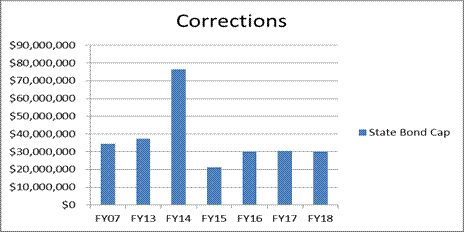Quick Links
- Report
- Introduction
- Administration Accomplishments & Initiatives
- Development of the FY14-18 Capital Investment Plan
- Affordability and Fiscal Responsibility
- Impact of Capital Budget on the Operating Budget
- Capital Investments in Gateway Cities
- Aggregate FY14-18 Capital Investment Plan
- Capital Investments by Investment Category
- Appendix A - Debt Affordability Analysis
- Appendix B - Bond Bills
- Appendix C - FY14 Capital Investment Project List, by Investment Category (pdf)
- Appendix D - FY14 Capital Project and Program Descriptions, by Project ID# (pdf)
- Plan by Investment
- Plan by Capital Agency
- Plan by Beneficiary Agency
- Downloads
Corrections
The Department of Correction operates 18 institutions with five security levels ranging from contract pre-release to maximum security. These facilities house over 10,000 criminally sentenced inmates in the jurisdiction of the Department of Correction, 600 incarcerated as civil offenders and 575 pre-trial or awaiting trial offenders. In addition to the correctional facilities managed by the Department of Correction, the Commonwealth has 18 jails, houses of correction and related correctional facilities located in 14 Massachusetts counties and managed by sheriffs.
The following graph reflects that Administration’s estimated capital investment in corrections capital projects over the next five years, as compared to fiscal years 2007 and 2013 corrections related spending.

Administration Accomplishments to Date
- In 2012, Governor Patrick signed a balanced sentencing reform bill that will allow many non-violent drug offenders to become immediately eligible for parole and eliminate parole eligibility for certain three-time violent offenders. In the long run, sentencing reform will help to mitigate the problem of overcrowding and reduce the need for the Commonwealth to build new facilities, which was previously estimated to cost $1.3 B to $2.3 B.
- The Administration prepared and released the Corrections Master Plan (CMP) in 2012 which builds on the Sentencing Reform and targets:
- Improving existing correctional facilities.
- Increasing bed space to alleviate overcrowding and improve access to programs and services that help prevent recidivism.
- Creating regional approaches to housing inmates that facilitate reentry into society.
- Massachusetts is one of thirteen states partnering with The Pew Center on the States using their Results First Model to employ a cutting-edge cost benefit analysis to analyze our criminal justice policies.
- Waste water treatment plants at Norfolk and Plymouth Department of Corrections facilities have been completed.
FY14 Highlights
- The Regional Western Massachusetts Women's Facility in Hampden County will be completed, moving women from Western Massachusetts to a more local facility and easing overcrowding at the state women’s facility at MCI Framingham.
- New reentry programming space will be created at Department of Correction facilities by renovating and repurposing administrative space at targeted locations.
- Construction of a new Intake Facility at Essex Sheriff’s Department will be completed this year, providing much needed space for safe and secure processing at the Middleton site.
- Funding in this plan will provide for the temporary relocation of detainees at the Middlesex Sheriff facility located in the Edward J. Sullivan Courthouse in Cambridge to the Middlesex Sheriff’s facility in Billerica. This relocation will allow for a comprehensive private redevelopment of the property, establishing a mixed use office and residential complex. Due to the scope of this project, it is included as an FY14 highlight in both the Corrections and Courts section.
- A $3.5 M dollar energy upgrade at Berkshire Sheriff Jail and House of Correction in Pittsfield will be completed and is estimated to save over $360 K annually.
- Construction of a $13.4 M dollar energy upgrade at NCCI Gardner will continue and will result in $1.1 M dollars in annual savings once completed.
- The Commonwealth will continue to study a new Southern Middlesex Justice Center which will replace the Edward J. Sullivan Judicial Complex in Cambridge and potentially consolidate several leases throughout Middlesex County.
 top of page
top of page